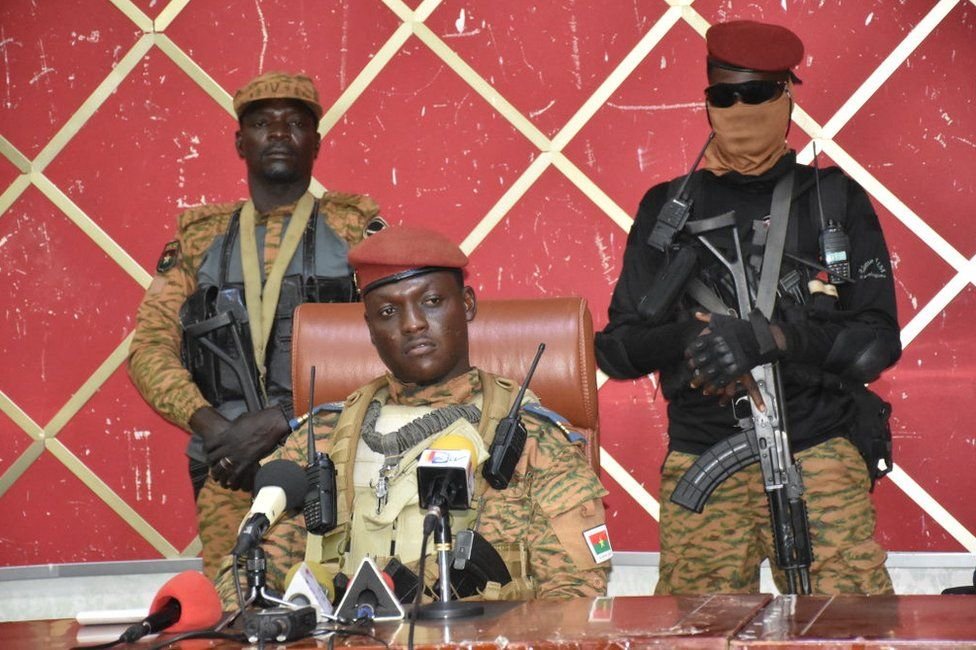Burkina Faso’s Second Coup of 2022 and What It Could Mean for the Future
Burkina Faso’s newly-proclaimed president Ibrahim Traoré at a meeting in Ouagadougou on Oct. 2, 2022. Source for image: BBC
On September 30th, 2022, Burkina Faso experienced its second coup d’etat of this year. A series of raids orchestrated by jihadists has recently left dozens of soldiers and civilians dead or missing, which provided a catalyst for military officers within the Burkina Faso army to depose Lieutenant-Colonel Paul-Henri Damiba and replace him with Captain Ibrahim Traoré, a previously a low-ranking officer in charge of an artillery regiment in a small northern town. In a televised statement made by Traoré, he justified the change in power due to Damiba’s inability to suppress a burgeoning Islamist insurgency in the north and east of the nation that has driven over two million people — roughly 10% of the population — from their homes. This second military junta comes into power only months after Damiba first assumed office in January by removing Roch Marc Christian Kaboré, who had been in power for the last six years. When Damiba came into power, his replacement of Kaboré was cheered by crowds of people in Burkina Faso’s capital city of Ouagadougou, as his predecessor had received criticism for his repressive methods of political management.
This coup is a continuation of the regime instability that has persisted in Burkina Faso intermittently dating back to 1960, when the country first gained its independence from France. In more recent history, the presence of a long-term president came about with Thomas Sankara's coming to power in 1983. He remained in office until he was assassinated in 1987, when his successor Blaise Compaoré and others staged a coup. Compaoré’s climb to the presidency is still protested by civilians today, as he was found guilty in April 2022 for being complicit in Sankara’s murder, who is considered a hero by many in Africa. Compaoré’s reign lasted for twenty seven years, until he was ousted by Kaboré in 2014 for wanting to change the Constitution in order to remain in power.
This frequency in violent regime change is a broader issue for West Africa as well, with several coups occurring in Mali and Guinea during the past two years. Prior to Traore's coup in Burkina Faso, there had been growing public disapproval of Damiba and his administration. During his eight-month presidential term, he failed to live up to initial promises to limit the spread of jihadist groups, unemployment, hunger, and displacement, all of which have worsened over the course of this year. The National Emergency Relief and Rehabilitation Council recorded 388,000 new displaced people in the country from December 2021 to April 2022 alone.
Regarding the future of Burkina Faso, the impact of this coup will be compounded by several issues that the country already faces, including a global food crisis, an economic crisis, growing natural resource scarcity, and worsening climatic disasters. Humanitarian efforts to provide aid to civilians have been impeded by the fact that more and more areas of intervention are inaccessible by road. The central Sahel region in Burkina Faso is one of the most affected areas, and Martin Griffiths, the UN Under-Secretary-General for Humanitarian Affairs, describes the region as “one of the most dangerous places in the world for aid workers.” The current state of the country’s government is very precarious. With these coups being able to effectively occur relatively quickly, there is the question of whether this change in power will inspire regime shifts in other West African countries, as this change of authority was accomplished with both rapidity and only a small number of soldiers.
As mentioned previously, a crucial factor that must be considered in this situation is the growing impact of climate change and its relationship to instability. Burkina Faso is one of the many countries located in the Sahel region of Africa, and experts predict that natural disasters such as desertification and drought will become more intense and frequent within the region in upcoming years, which could in turn fuel the occurrence of violent conflict caused by decreasing availability of crucial natural resources. With this amalgamation of issues, the future of the people of Burkina Faso is becoming increasingly perilous, possibly leading to a wide range of issues for both the Burkinabes as well as those in surrounding countries.

